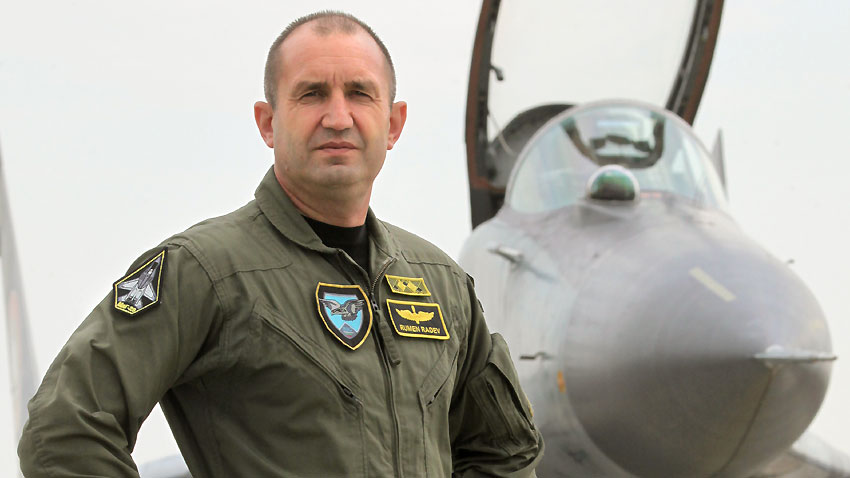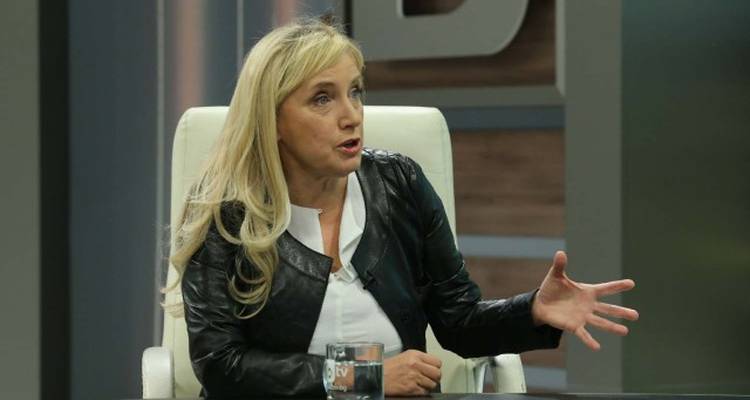
Major General Rumen Radev
Originally appeared at A-specto, translated by Valentina Tzoneva exclusively for SouthFront
An interview of Antoinette Kiselincheva with Elena Yoncheva, a journalist and a member of the Initiative Committee which raised Rumen Radev’s candidacy for president.
What have the Bulgarians voted for: a personality, a change against the status quo? What is the contribution of the BSP (Bulgarian Socialist Party) for the victory of General Radev?
I think that people voted for both the person and against the status quo. They voted for the person who has his own biography. Rumen Radev actually fought battles and won. In his career, he has been a leader but he earned his leadership position and was not assigned to it. Apart from this, people voted for a man who obviously has no dependencies. The fact that General Radev is supported by the BSP does not mean that he is dependent on it. Reading his biography shows that he has no corporate or party dependencies, therefore, it was a vote for the person.
On the other hand, the people voted against the arrogant campaign, which was led by those who backed the other candidate – Tsetska Tsacheva. The threats of destabilization, chaos, the crash of the country if the candidate of GERB is not elected is perceived as a kind of blackmailing of voters. I think that all this largely alienated the people. I think that the television debate also largely helped Rumen Radev, who is sincere and who was not demonstrated there. One of the candidates sought to evoke sympathy in the electorate, citing that its youth and beauty were gone already. But Bulgarians do not want to have a president who is trying to win elections by sorrows. Moreover, the story about the grandfather of Mrs. Tsacheva was actually a sad moment for all viewers because they saw that it was not sincere. Later on, it was understood that she had previously already told the story.
General Rumen Radev was a majority candidate, but if the BSP had presented a party person, would that have won the election for them?
I do not think this is a victory for the BSP. Of course, it has contributed because thanks to the BSP, General Radev got a large enough platform to be seen by all Bulgarians. As we saw in the election result, the rights and lefts voted for him, half of the reformers, more than half of the patriots. Indeed, he won the election by a vote of all the Bulgarians, a wide range of people with different political views. In this sense, he became a unifier of the nation president, but he has yet to prove that this is the case and begin the real battle to be called “our president.” This, first of all, is a battle against the division of the country, the hatred and inciting of the people against each other, for which the politicians are largely to blame. The ‘contribution’ of the president, whose term has expired, is very high in this regard.
Since he is a non-party representative, do you think that the vote was indicative for the clichéd party candidates? Are the citizens ready to vote for new and unknown candidates in the role of politicians’ personalities?
It is not necessary for a president to have a political career. The Bulgarian should vote for a person, regardless of which community they come from; to vote for a man who has proven in his life and career what he is capable of and what ideals he is ready to fight for, and not only vote on behalf of the party. In these elections, the Bulgarians voted against the trend of one party nominating a candidate, regardless of his/hers merits. This is what GERB did. We all remember the phrase from the last elections: “and if I point out a donkey, the donkey will be elected.” I think people are offended by this approach, and in a sense, this is a protest vote against the manner in which the presidential campaign was conducted.

Elena Yoncheva
The Bulgarian society knows the circles which ruled over our previous president and where the balance leaned in politics led by him. In comparing General Radev to Rosen Plevneliev, in what way will he most strongly distinguish himself from him?
This is a conversation that I hope to be able to continue after five years, meaning that such an answer we can give over time. My expectation is not to be ashamed of my president. Unfortunately, the level of political culture in Bulgaria is so low that our expectations are already very low. Not be ashamed of the president – this is no longer a small matter.
During the campaign, General Radev was stigmatizing that he takes a pro-Russian stance on some issues. At the same time, from his biography it is known that he graduated from the US Air Base College, Maxwell, and he has repeatedly stated that Bulgaria’s membership in the EU and NATO is not questionable. Will Radev manage to balance the influence of the two global factors?
I think that he is a pragmatist and will be “our man,” neither for Moscow or Washington. Apart from this, his biography does not suggest in any way that he could stagger in a direction that does not correspond to our national interest. So I believe he will have a balanced position on key foreign policy issues.
This may be another paragraph in which to discern the outgoing president.
Yes! (Laughs) And a first lady who is presentable, beautiful and smart will stand next to him.
Turkey is becoming a more and more difficult neighbor, but at the same time, is our partner in NATO. What line should the future president lead regarding our southern neighbor to protect our national interests?
I think you should first look at what happens here in Bulgaria. Firstly, he needs to strengthen our borders and stop the smuggling. Because there is nothing stronger than the state and if the state wants to stop the smuggling, it alone can do it. I think that information about how people manage to cross the border is hidden from the society. Thanks to Serbia, which activated its army, we realized that in practice, Bulgaria is a free corridor through which migrants pass. It may come back like a boomerang, referring to the agreement that we have signed for the possible return of refugees to the first EU country which they have entered – the Dublin Agreement. This is the first thing we need to do. Moreover, I think that when we talk about Turkey, we must be cautious towards a particular party and interests which it represents. It is DOST – a party that represents the interests of Turkey, Erdogan’s party in Bulgaria, the party whose leader disappeared into the Turkish Embassy in Sofia and the party that fully supported the candidacy of GERB. We should pay attention to what its role is in Bulgarian political life.
We all know that during the campaign, politicians are one thing but in real politics, they are another. Do you think that General Radev will change as they talk about Trump? General Radev spoke against sanctions against Russia but do you think he will take real action?
Bulgaria is not a presidential but parliamentary republic. So Rumen Radev will have to comply with the decisions of the parliament and the government, which manages Bulgaria. But at the same time, a president has enough mechanisms to make his voice heard or a real debate in the society. Therefore, if a parliament and a ruling party do not take decisions that are in the interest of the society, the president can be corrective in reality.
I do not doubt at all that as president, General Radev will face many challenges. I personally believe from what I felt through communicating with him that he carries the honor and dignity of a solder. Everything makes me think that he will deal with these challenges. He will be able to resist!
Do you think that the choice of Radev is part of a line of protest of the people against the elites, as was the case of Trump in the US? Is there an indirect connection between them?
Of course, this is a protest vote because people are tired of political duality, from the arrogance of the whole political system of intrigue and incitement from politicians to people against one another. It was a protest vote against the entire political system. So, people voted for a person who is not a part of the whole political situation, for a person who is not polluted by the political life in Bulgaria.
According to you, will this wave of public discontent be resistant and lead to results which will bring in change in the political environment?
I think that it will be an uphill battle. I’m not naive and do not think that this will lead to a rapid change. But at least the journalists, seeing that their managers are not invincible, will begin to talk and feel a little more freely. I think that the journalists will start a freer debate about what actually happens in the state. What happened will unleash a more honest conversation, which in itself is a good direction.



